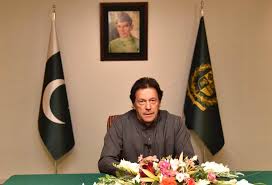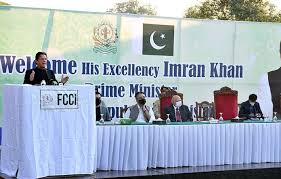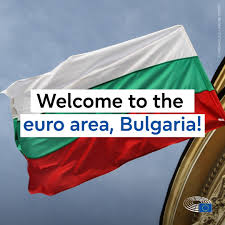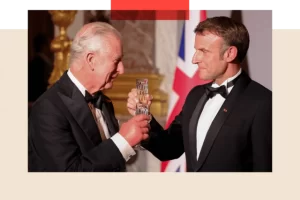PM pushes industrialists to invest freely

Faisalabad: Prime Minister Imran Khan Wednesday urged the businessmen and exporters to invest freely in the country with no worry for any policy shift or bottlenecks as the government was fully focused at reviving industrialization through maximum facilitation.

“Invest more on exports without worry. The government will resolve all of your issues. You should not be afraid of any policy shift to affect your investment. Our job is your facilitation, which will lead to creation of wealth and jobs,” the prime minister said while addressing here a gathering of exporters and industrialists.
Minister for Industries and Production Hammad Azhar, Planning Minister Asad Umar, Punjab Governor Chaudhry Sarwar and Chief Minister Usman Buzdar also attended the ceremony, besides a limited number of businessmen, exporters and industrialists owing to anti-COIVD19 precautions.
The prime minister said it was pleasing that the industries and power looms were running at full capacity which even created shortage of textile labour. He asked the Punjab government to promote skill training of the youth to enhance value-added textile workforce.
He said if Faisalabad, once known as Pakistan’s Manchester, kept up its current pace of industrial development, it would even leave Manchester behind.
The prime minister recalled that the Pakistan Tehrik-e-Insaf government inherited a record debt burden, $20 billion current account deficit, $40 billion trade deficit, devalued currency, and the reserves at the lowest ebb.
The country was even short of money to make international payments but the government successfully passed through the difficult phase courtesy the timely support by the friendly states saving it from default, he added.
The prime minister said since 1960s, Pakistan’s industrial model institutions like hospitals and universities used to be idolized but it took a downturn following the then government’s policy of nationalization.
Instead of introducing nationalization, the government should have done legislation to channelize into the national economy the money which had been accumulated within few families, he added.
He said through similar policies, China steered around 700 million people out of poverty, but contrarily, the nationalization in Pakistan impeded the growth.
He said after nationalization, even money making was considered a taboo which instead should have been encouraged, if through legal means and not through cartelization or profiteering.
“Our full focus is to take Pakistan to industrialization and enhance exports. The government will facilitate and bring ease of doing business. We are fully striving to attract people to invest and create jobs. This will happen through ease of doing business,” the prime minister said.
He told the gathering that the automation of Federal Board of Revenue was also in process to reduce human intervention.
The prime minister said the government’s policy of providing incentives to exporters was paying dividends as exports were on surge.
He said contrary to the world, Pakistan maintained balance between lives and livelihood during the COVID-19 which kept people from poverty and economy from default.
He also appreciated his economic team including Hammad Azhar, NCOC and others for helping the government formulate policies to incentivize business and industries besides containing the pathogen.
He said even the World Health Organization (WHO) also lauded Pakistan for successfully navigating during COVID-19.
However, he advised the people not to give up wearing mask as the second wave had hit the country again, to ebb away pressure from economy as well as hospitals.
As requested by the Faisalabad Chamber of Commerce and Industry (FCCI), the prime minister assured to uplift the city’s infrastructure.
He said despite being the opposition led province, the government also announced a mega development package for Karachi.
He said the government was toeing the policy of industrialization and all the relevant policies would be formulated after consultation with the stakeholders.
He said following the government’s business friendly policies and packages, the industrial and construction sectors were showing improvement.
As pointed out from audience, the prime minister agreed to the idea of establishing a high court bench in Faisalabad for ease of the litigants.
He said the government was coming up with a local government system to run the major cities on the model of world’s biggest cities like London, New York, Paris and Mumbai which directly elected their mayors and also generated revenue through own tax collection.
Similarly, he said currently, being an industrialist and mega city, Faisalabad had to depend on funds from Punjab government which would be done away with under the new system.
In his address, Punjab Chief Minister Usman Buzdar announced Rs 13 billion development package for infrastructural uplift of Faisalabad which he said would be included in the annual development program.
He told the audience that the provincial government provided Rs 26 billion tax relief to the industrial sector during COVID-19. The provincial government had also issued NOC for five more cement factories and 16 more to be issued by December which manifested the growth of construction industry, he added.
The chief minister said in order to improve law and order situation in the province, the government handed over 600 police vehicles to the police stations and also approved 10,000 posts for recruitment.
Industries Minister Hammad Azhar said the textile industry and power looms had made a turnaround within two years of the PTI government to create jobs under PM’s vision of 10 million jobs.
He said unlike its predecessor, the incumbent government was spending nothing to artificially uplift the local currency rather it had opted for free floating.
Moreover, he said 21 of 28 points given by FATF had been implemented and rest would be fulfilled soon.
The government had made Rs 248 billion tax refunds to the businessmen, he added.
FCCI President Engineer Ehtisham Javed said the government’ textile policy was paying dividends in form of increased production and exports.
He hoped that Faisalabad would again regain get its lost identity Pakistan’s Manchester. He also thanked the prime minister for his prudent and pro-poor policies during the COVID-19 which helped both the people as well as the businesses.





